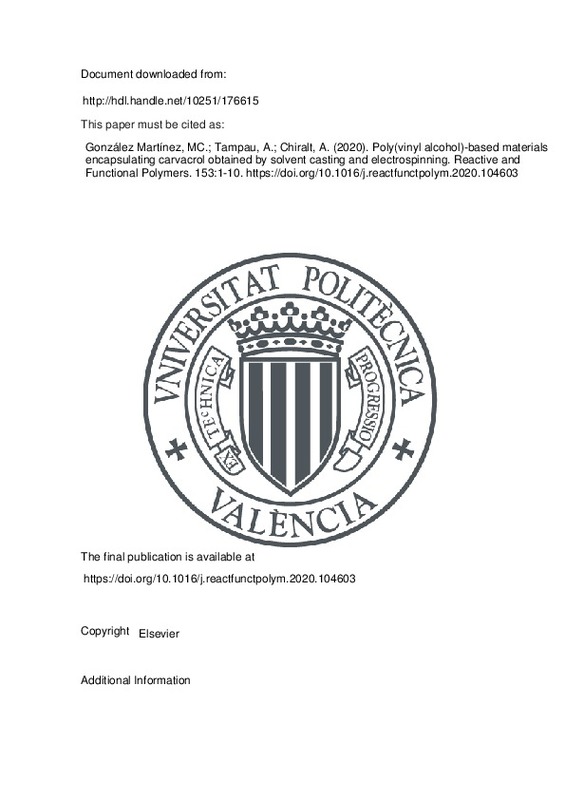JavaScript is disabled for your browser. Some features of this site may not work without it.
Buscar en RiuNet
Listar
Mi cuenta
Estadísticas
Ayuda RiuNet
Admin. UPV
Poly(vinyl alcohol)-based materials encapsulating carvacrol obtained by solvent casting and electrospinning
Mostrar el registro sencillo del ítem
Ficheros en el ítem
| dc.contributor.author | González Martínez, María Consuelo
|
es_ES |
| dc.contributor.author | Tampau, Alina
|
es_ES |
| dc.contributor.author | Chiralt, A.
|
es_ES |
| dc.date.accessioned | 2021-11-09T04:34:08Z | |
| dc.date.available | 2021-11-09T04:34:08Z | |
| dc.date.issued | 2020-08 | es_ES |
| dc.identifier.issn | 1381-5148 | es_ES |
| dc.identifier.uri | http://hdl.handle.net/10251/176615 | |
| dc.description.abstract | [EN] Carvacrol has been encapsulated in polyvinyl alcohol (PVA) matrices by electrospinning and casting. Aqueous solutions containing 15% PVA and 15% carvacrol with respect to polymer have been used, containing or not Tween 85 at 0.3 g/100 g carvacrol. Electrospun mats exhibited beads and thin fibres which became thinner and interrupted when carvacrol was present and retained up to 83% of this compound. The encapsulation efficiency in the electrospun mats decreased in the presence of surfactant, reaching values similar to those of casting (75-77%). The electrospun, surfactant free material was practically amorphous with 40% of the total carvacrol non-thermally releasable. In contrast, when surfactant was present and in cast material, with 40% crystallinity, the strongly bonded carvacrol ratio decreased. Specific PVA - phenolic hydroxyl interactions played an important role in the degree of carvacrol retention in the matrices, which depended on surfactant's presence and processing method | es_ES |
| dc.description.sponsorship | The authors thank the Ministerio de Economia y Competitividad (MINECO) of Spain, for the financial support provided for this study as part of the project AGL2016-76699-R. The author A. Tampau also thanks MINECO for the pre-doctoral research grant #BES-2014068100 | es_ES |
| dc.language | Inglés | es_ES |
| dc.publisher | Elsevier | es_ES |
| dc.relation.ispartof | Reactive and Functional Polymers | es_ES |
| dc.rights | Reserva de todos los derechos | es_ES |
| dc.subject | Polyvinyl alcohol | es_ES |
| dc.subject | Carvacrol | es_ES |
| dc.subject | Electrospinning | es_ES |
| dc.subject | Casting | es_ES |
| dc.subject | Encapsulation efficiency | es_ES |
| dc.subject.classification | TECNOLOGIA DE ALIMENTOS | es_ES |
| dc.title | Poly(vinyl alcohol)-based materials encapsulating carvacrol obtained by solvent casting and electrospinning | es_ES |
| dc.type | Artículo | es_ES |
| dc.identifier.doi | 10.1016/j.reactfunctpolym.2020.104603 | es_ES |
| dc.relation.projectID | info:eu-repo/grantAgreement/MINECO//BES-2014-068100/ES/BES-2014-068100/ | es_ES |
| dc.relation.projectID | info:eu-repo/grantAgreement/AEI//AGL2016-76699-R//MATERIALES BIODEGRADABLES MULTICAPA DE ALTA BARRERA PARA EL ENVASADO ACTIVO DE ALIMENTOS./ | es_ES |
| dc.rights.accessRights | Abierto | es_ES |
| dc.contributor.affiliation | Universitat Politècnica de València. Departamento de Tecnología de Alimentos - Departament de Tecnologia d'Aliments | es_ES |
| dc.contributor.affiliation | Universitat Politècnica de València. Instituto Universitario de Ingeniería de Alimentos para el Desarrollo - Institut Universitari d'Enginyeria d'Aliments per al Desenvolupament | es_ES |
| dc.description.bibliographicCitation | González Martínez, MC.; Tampau, A.; Chiralt, A. (2020). Poly(vinyl alcohol)-based materials encapsulating carvacrol obtained by solvent casting and electrospinning. Reactive and Functional Polymers. 153:1-10. https://doi.org/10.1016/j.reactfunctpolym.2020.104603 | es_ES |
| dc.description.accrualMethod | S | es_ES |
| dc.relation.publisherversion | https://doi.org/10.1016/j.reactfunctpolym.2020.104603 | es_ES |
| dc.description.upvformatpinicio | 1 | es_ES |
| dc.description.upvformatpfin | 10 | es_ES |
| dc.type.version | info:eu-repo/semantics/publishedVersion | es_ES |
| dc.description.volume | 153 | es_ES |
| dc.relation.pasarela | S\410605 | es_ES |
| dc.contributor.funder | AGENCIA ESTATAL DE INVESTIGACION | es_ES |
| dc.contributor.funder | MINISTERIO DE ECONOMIA Y EMPRESA | es_ES |







![[Cerrado]](/themes/UPV/images/candado.png)

